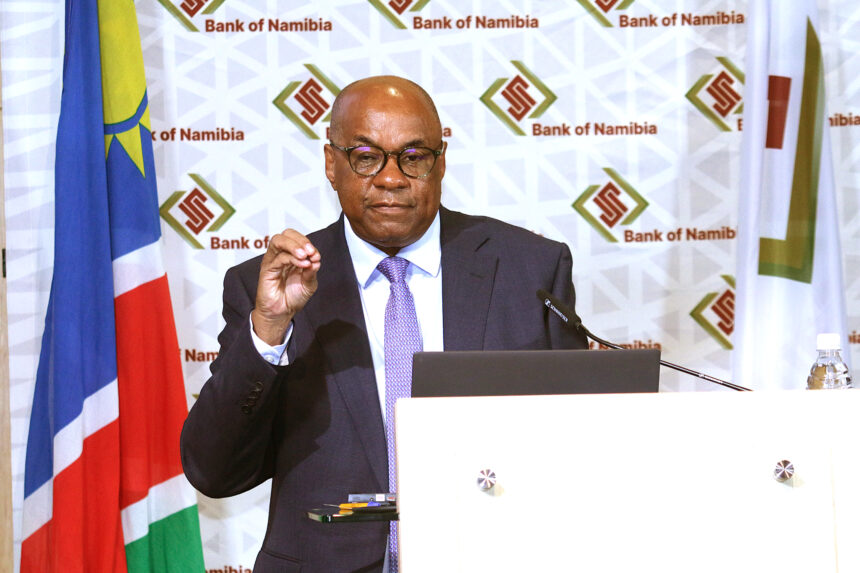Bank of Namibia Governor Johannes !Gawaxab has cautioned that the economic fallout from renewed United States of America trade tariffs imposed under president Donald Trump’s administration, coupled with the uncertainty surrounding tariff details, will adversely impact sectors such as diamonds, marble and manufacturing.
Tariffs are defined as taxes charged on goods bought from other countries. These tariffs can be used to influence trading partners, raise revenues or protect competitive advantages.
In an escalating global trade war, Trump has placed tariffs of up to 145% on Chinese goods, while China has hit back with 125% on US products. Facing severe pushback from various sectors, the Trump administration unexpectedly paused additional tariffs on all countries except China, not including 10% blanket tariffs still in force on all US trading partners.
The reality show boss US president believes tariffs will boost US manufacturing and protect jobs, but the world economy has been thrown into chaos with general consumer prices expected to rise. Economists have also warned that Trump’s tariffs will continue to push up global inflation while significantly increasing a risk of a US recession.
!Gawaxab acknowledged during last week’s repo rate announcement in Windhoek that the full economic impact of tariffs remains difficult to quantify, but emphasised that the ripple-effects will be felt across various segments of the economy, particularly through external trade pressures.
“What we know is sectors such as diamonds, marble and manufacturing will be negatively impacted. Further prevailing uncertainties will impact investments and consumption decisions,” said the central bank governor.
Heightened global volatility has also prompted the central bank to revise its inflation forecast upward. Initially projected to average around 4% in 2025, inflation is now expected to reach 4.2%, with a similar upward revision made for 2026.
“A weakening exchange rate, combined with imported inflation stemming from these tariffs, will place upward pressure on prices. However, the falling oil prices could act as a mitigating factor, helping to ease some inflationary pressures,” said !Gawaxab.
“It’s very difficult to quantify that for you, but we can tell you that the direct exposure (to the tariffs) appears very minimal for the Namibian economy”.
That said, the indirect effects, particularly through the diamond sector, are already being felt. “The diamond market is already going through a difficult time due to low demand and increased competition from lab-grown diamonds. Now, we have got all these tariffs added to the pressure,” he stated.
The Governor suggested that Namibia might consider lobbying for exemptions for diamonds, similar to concessions already granted for uranium and gold.
Also sounding the alarm last week on Trump’s tariffs was US Federal Reserve chairman Jerome Powell, who warned that US inflation could rise and growth could slow as a result of Trump’s tariff policies. During a speech at the Economic Club of Chicago, Powell said the Fed was trying to limit price increases from Trump’s tariffs in a bit to contain inflation.
“The level of tariff increases announced so far is significantly larger than anticipated, and the same is likely to be true of the economic effects, which will include higher inflation and slower growth,” he noted.
Repo rate
Meanwhile, !Gawaxab announced that the repo rate will remain unchanged at 6.75%. Commercial banks are expected to maintain their prime lending rates at 10.50%. This monetary policy stance will continue safeguarding the one-to-one link between the Namibia Dollar and the South African Rand, while supporting domestic economic activity.
Banking solution
In addition, the BoN will soon introduce an inclusive, cheap banking solution as Namibia is developing an initiative called the Instant Payment Solution, which is expected to be launched either before the end of the year, or the beginning of 2026.
The BoN Governor said the initiative will draw informal and rural Namibians into the banking sector, and help reduce fees and charges.
“The Instant Payment Solution will provide fast, affordable and inclusive digital payment options and lower transaction costs,” he stressed.
!Gawaxab also highlighted that by the end of December 2024, total loans to Namibia’s banks amounted to almost N$120 billion worth of credit extended to all sectors of the economy. This credit extension is mostly dominated by homeloan mortgages, making up almost 40% of the total.
-pmukokobi@nepc.com.na



